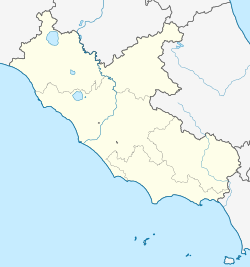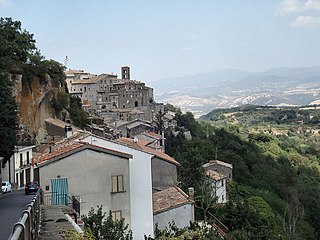
Bomarzo is a town and comune of the province of Viterbo, in the lower valley of the Tiber. It is located 14.5 kilometres (9.0 mi) east-northeast of Viterbo and 68 kilometres (42 mi) north-northwest of Rome.

The Duchy of Parma and Piacenza was an Italian state created in 1545 and located in northern Italy, in the current region of Emilia-Romagna.

Valentano is a town and comune of the province of Viterbo, in the Lazio region of central Italy. It is 33 kilometres (21 mi) from the provincial capital, Viterbo.

Pier Luigi Farnese was the first Duke of Castro from 1537 to 1545 and the first Duke of Parma and Piacenza from 1545 to 1547. He was the illegitimate son of Cardinal Alessandro Farnese. He became a soldier and participated in the sack of Rome in 1527.

Ranuccio II Farnese was the sixth Duke of Parma and Piacenza from 1646 until his death nearly 50 years later. He was also the Duke of Castro from 1646 until 1649.
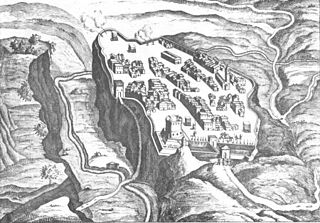
Castro was an ancient city on the west side of Lake Bolsena in the present-day comune of Ischia di Castro, northern Lazio, Italy. It was destroyed at the conclusion of the Wars of Castro in the 17th century.

The Wars of Castro were a series of conflicts during the mid-17th century revolving around the ancient city of Castro, which eventually resulted in the city's destruction on 2 September 1649. The conflict was a result of a power struggle between the papacy – represented by members of two deeply entrenched Roman families and their popes, the Barberini and Pope Urban VIII and the Pamphili and Pope Innocent X – and the Farnese dukes of Parma, who controlled Castro and its surrounding territories as the Duchy of Castro.

The House of Farnese was an influential family in Renaissance Italy. The titles of Duke of Parma and Piacenza, Duke of Latera and Duke of Castro were held by various members of the family.

Lake Bolsena is a lake of volcanic origin in the northern part of the province of Viterbo called Alto Lazio or Tuscia in central Italy. It is the largest volcanic lake in Europe. Roman historic records indicate activity of the Vulsini volcano occurred as recently as 104 BC; it has been dormant since then. The two islands in the southern part of the lake were formed by underwater eruptions following the collapse that created the depression.

Canino is a town and comune of Italy, in the province of Viterbo in the internal part of Maremma Laziale. It is 15 kilometres (9 mi) west of Valentano and 44 kilometres (27 mi) northwest of Viterbo.

Arce is a comune (municipality) in the province of Frosinone, in the region of Lazio, Italy. it is an agricultural centre located on a hill overlooking the Via Casilina, in the Latin Valley and in the middle valley of the Liri.

Castell'Arquato is an Italian town located on the first hills of Val D’Arda in the province of Piacenza, in Emilia-Romagna, approximately 30 kilometres (19 mi) from Piacenza and 35 kilometres (22 mi) from Parma. Places nearby include Bacedasco, Vigolo Marchese, Fiorenzuola d'Arda, Lugagnano Val d'Arda, and Vernasca. It is one of I Borghi più belli d'Italia.
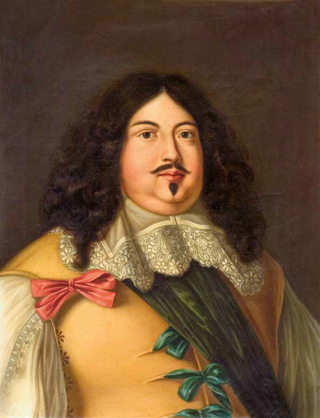
Odoardo Farnese, also known as Odoardo I Farnese to distinguish him from his grandson Odoardo II Farnese, was Duke of Parma, Piacenza and Castro from 1622 to 1646.

Colorno is a comune (municipality) in the Province of Parma in the Italian region Emilia-Romagna, located about 90 kilometres (56 mi) northwest of Bologna and about 15 kilometres (9 mi) north of Parma.

Castiglione in Teverina is a comune (municipality) in the Province of Viterbo in the Italian region Lazio, located about 90 kilometres (56 mi) northwest of Rome and about 25 kilometres (16 mi) northeast of Viterbo.

Gradoli is a comune (municipality) in the Province of Viterbo in the Italian region of Latium, located about 100 kilometres (62 mi) northwest of Rome and about 35 kilometres (22 mi) northwest of Viterbo.
Ischia di Castro is a comune (municipality) in the Province of Viterbo in the Italian region of Latium, located about 90 kilometres (56 mi) northwest of Rome and about 30 kilometres (19 mi) northwest of Viterbo.
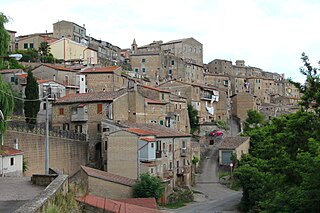
Onano is a comune (municipality) in the Province of Viterbo in the Italian region Lazio, located about 100 kilometres (62 mi) northwest of Rome and about 40 kilometres (25 mi) northwest of Viterbo.
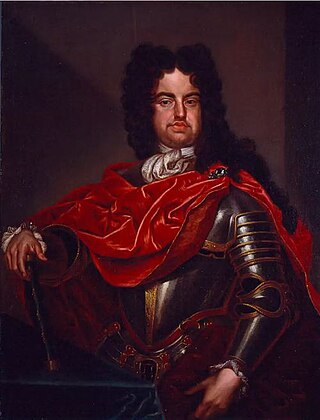
Francesco Farnese reigned as the seventh Farnese Duke of Parma and Piacenza from 1694 until his death. Married to Dorothea Sophia of the Palatinate, his brother Odoardo's widow, to avoid the return of her dowry, Francesco curtailed court expenditure, enormous under his father and predecessor, Ranuccio II, while preventing the occupation of his Duchy of Parma, nominally a Papal fief, during the War of the Spanish Succession.

The Duchy of Castro was a fiefdom in central Italy formed in 1537 from a small strip of land on what is now Lazio's border with Tuscany, centred on Castro, a fortified city on a tufa cliff overlooking the Fiora River which was its capital and ducal residence. While technically a vassal state of the Papal States, it enjoyed de facto independence under the rule of the House of Farnese until 1649, when it was subsumed back into the Papal States and administered by the House of Stampa di Ferentino.




